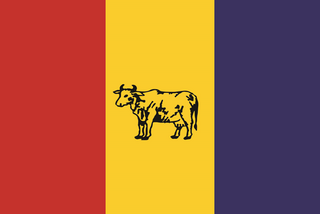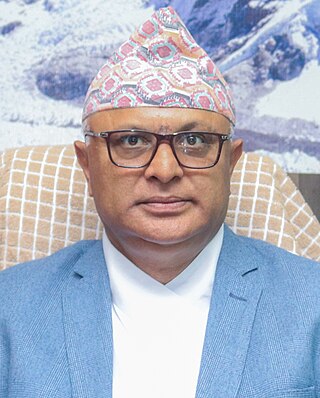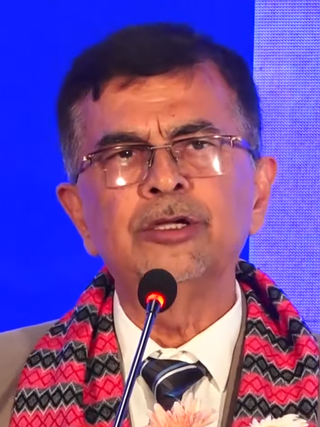
The Communist Party of Nepal (Unified Marxist–Leninist) (Nepali: नेपाल कम्युनिष्ट पार्टी (एकीकृत मार्क्सवादी-लेनिनवादी), romanized: nēpāl kamyuniṣṭ pārṭī (ēkīkṛt mārksavādī-lēninavādī); abbr. CPN (UML)) is a communist political party in Nepal. The party emerged as one of the major parties in Nepal after the end of the Panchayat era.

The Rastriya Prajatantra Party is a constitutional monarchist and Hindu nationalist political party in Nepal.

The Nepal Communist Party, abbreviated NCP is a defunct communist party which existed in Nepal from 2018 to 2021. It was founded on 17 May 2018, from the unification of two leftist parties, Communist Party of Nepal and Communist Party of Nepal. The unification was completed by the Party Unification Coordination Committee, after eight months of negotiation. The two predecessor parties subsequently dissolved, making way for the new united party. The party retained the electoral symbol of the CPN (UML), the sun.

The Minister for Industry, Agriculture and Cooperatives is the head of the Ministry of Industry, Agriculture and Cooperatives of the Government of Koshi Province. One of the senior-most officers in the Provincial Cabinet, the minister is responsible for promoting the cooperative sector in national development and adopting policies related to agriculture and land reform, realising the need for land management, formulation implementation and regulation of land management in Koshi Province.

Bagmati Province is one of the seven provinces of Nepal established by the constitution of Nepal. Bagmati is Nepal's second-most populous province and fifth largest province by area. It is bordered by Tibet Autonomous Region of China to the north, Gandaki Province to the west, Koshi Province to the east, Madhesh Province and the Indian state of Bihar to the south. With Hetauda as its provincial headquarters, the province is also the home to the country's capital Kathmandu, is mostly hilly and mountainous, and hosts mountain peaks including Gaurishankar, Langtang, Jugal, and Ganesh.
Events in the year 2018 in Nepal.

The provinces of Nepal are governed by provincial governments which form the second level of governance in the country; after the federal government. The provincial governments are established, and their structure is defined by Part 13 of the Constitution of Nepal.

Trilochan Bhatta is a Nepalese politician and former Chief Minister of Sudurpashchim Province, a province in far-western Nepal. He was unanimously selected Parliamentary Party leader of Communist Party of Nepal for Sudurpashchim pradesh on 12 February 2018. He was appointed as the chief minister, according to Article 168 (1) of the Constitution of Nepal and took the oath of his office and secrecy as a chief minister on 17 February 2018.

In the Federal Democratic Republic of Nepal, a governor is the constitutional head of each of the seven provinces. Sub-Article 1 of Article 163 of the Constitution of Nepal says that the Governor is a representative of the Government of Nepal in each province. The governor is appointed by the president of Nepal recommended by federal cabinet for a term of five years and holds office at the president's pleasure. A person who has once served as the governor of a province cannot be appointed to the same post twice. The governor is de jure head of the provincial government; all its executive actions are taken in the governor's name. However, the governor must act on the advice of the popularly elected council of ministers, headed by the chief minister, which thus holds de facto executive authority at the province-level. The Constitution of Nepal also empowers the governor to act upon his or her own discretion, such as the ability to appoint or dismiss a ministry, recommend president's rule for the president's assent.
Dormani Poudel was sworn in as Chief Minister of Bagmati Province on 12 February 2018. Here is the list of ministers.
Events in the year 2021 in Nepal.

Krishna Chandra Nepali was sworn in as Chief Minister of Gandaki Province on 12 June 2021. This government was supported by CPN(Maoist-Centre), NSP while Rastriya Janamorcha supported without joining the government.
The chief minister of the Bagmati Province is the head of government of Bagmati Province. The chief minister is appointed by the governor of the province according to Article 167 of the Constitution of Nepal. The chief minister remains in office for five years or until the provincial assembly is dissolved, and is subject to no term limits, given that they have the confidence of the assembly.

Rajendra Prasad Pandey is a Nepalese politician, belonging to the CPN currently serving as the Chief minister of Bagmati Province. He's also the deputy chairman of the CPN.
The Jeevan Bahadur Shahi cabinet is the council assembled by Jeevan Bahadur Shahi, who was sworn in as Chief Minister of Karnali Province on 3 November 2021. This government was supported by CPN(Maoist-Centre) and CPN.
The chief minister of the Madhesh Province is the head of government of Madhesh Province. The chief minister is appointed by the governor of the province according to Article 167 of the Constitution of Nepal. The chief minister remains in office for five years or until the provincial assembly is dissolved, and is subject to no term limits, given that they have the confidence of the assembly.

The Rajendra Kumar Rai cabinet was the 3rd provincial government of Province No. 1. It was formed after Rajendra Kumar Rai was sworn in as Chief Minister on 2 November 2021. The cabinet was expanded on 6 February 2022.
The first Bagmati Provincial Assembly was elected by the 2017 provincial elections in Nepal. 110 members were elected to the assembly, 66 of whom were elected through direct elections and 44 of whom were elected through the party list proportional representation system. The term of the assembly started on 1 February 2018 and ended in September 2022. Dormani Poudel and Astalaxmi Shakya served as the chief ministers from the CPN (UML) and Rajendra Prasad Pandey served as chief minister from CPN during the term of the assembly. Sanu Kumar Shrestha served as the speaker of the assembly and Radhika Tamang served as the deputy speaker.
The first Lumbini Provincial Assembly was elected by the 2017 provincial elections. 87 members were elected to the assembly, 52 of whom were elected through direct elections and 35 of whom were elected through the party list proportional representation system. The term of the assembly started on 4 February 2018 and ended in September 2022. Shankar Pokharel from the CPN (UML) and Kul Prasad KC from the CPN served as chief ministers during the term of the assembly. Purna Bahadur Gharti served as the speaker of the assembly and Krishni Tharu served as the deputy speaker.
The Kedar Karki cabinet was the 8th provincial government of Koshi Province. It was formed after Kedar Karki was sworn in as Chief Minister of Koshi Province on 15 October 2023.











